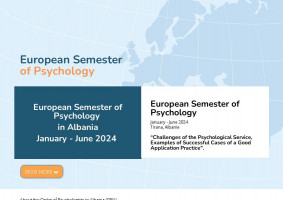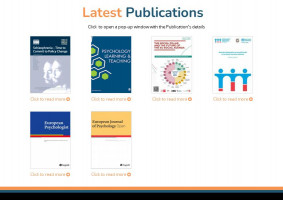Latest Publications
Click to open a pop-up window with the Publication's details
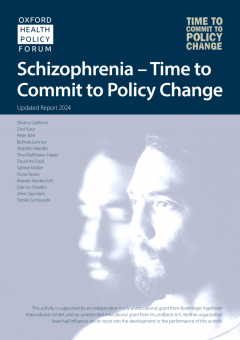
Click to read more
Schizophrenia: Time to Commit to Policy Change 2024
Schizophrenia is recognised as one of the most complex and profound mental health conditions, steeped in both myth and reality. Efforts needs to be multifaceted, including policy development, treatment guidance and scientific innovation, with all stakeholders working together to ensure meaningful progress. This report delves into the unique needs of people with schizophrenia, exploring supportive measures for their well-being, practical and attainable recommendations for change. The message to all nations, policy makers, payers and healthcare professionals is clear: strive for excellence, but most importantly start somewhere!

Click to read more
Psychology Learning & Teaching
Skills and Competencies Gained From a Psychology Bachelor's Degree: European Graduates’ Perspectives
Ioulia Papageorgi , Nicola Falzon, […], and Stephan Dutke
Results from a survey conducted by the European Federation of Psychologists’ Associations Board of Educational Affairs are reported. A total of 227 psychology graduates from across Europe responded to an online survey. Participants were presented with a set of psychology subject-specific competencies and a set of general competencies and asked to rate the extent to which (a) their Bachelor studies supported the development of these competencies and (b) these competencies were relevant for employment as well as to comment on the value of a Psychology Bachelor degree. Findings suggest that an education in psychology develops psychological skills, but also graduates with more general competencies. Overall, psychological competencies appear to develop to a high level through the Bachelor in Psychology, with the exception of specific practical skills. On the contrary, general competencies appear to not develop to an adequate degree. Practical skills focusing on the administration of psychological tools, psychometric instruments and specialist software, as well as general competencies relating to computer literacy skills, communication skills and team-working skills should be further developed to prepare graduates adequately for employment. The study highlights the value of an education in psychology particularly for those individuals who do not wish to enter the applied psychology professions or academia.
Buy acess to the article here

Click to read more
The Social Pillar and the future of the EU Social Agenda
After enduring decades of neoliberal policymaking that advocated for a small state and promoted the market as the primary instrument for efficiently allocating jobs and resources, the welfare state must undergo significant revitalisation, facilitated by the European Pillar of Social Rights (EPSR).
Understanding the EPSR’s impact on equal opportunities, working conditions, and social protection and inclusion is central to addressing the critical socio-economic challenges and the ‘new social risks’.
Given the redesign of the EU economic governance, the start of a new legislature in Brussels in 2024, the upcoming EPSR Action Plan review of 2025, the context of the war in Ukraine, the ‘cost-of-living’ crisis, the green and digital transitions, and the splintering of the political landscape, the EPSR and its role as a compass and counter-crisis narrative has never been more important. However, the emphasis on the EPSR and the implementation of its 20 thematic principles is not guaranteed to remain in place.
Additionally, addressing the diverse needs of Member States and ensuring effective coordination between national and EU-level initiatives is essential for successfully implementing the Pillar’s objectives, which requires further measures, continuous monitoring, robust enforcement mechanisms, and adequate financial resources.
This policy study offers an analysis of the EU’s progress in advancing equal opportunities, improving working conditions and strengthening social protection and inclusion as envisioned by the EPSR, both at the national and European levels. Furthermore, it underscores the importance of social partners and civil society organisations’ insights in shaping effective policies and decisions through a “Shadow Social Agenda” for the next legislature. The authors identify key areas requiring intervention, such as education, employment, health and care along the life cycle, and social protection, and highlight new ones where reflection is necessary.
This publication was launched at an event that took place on February 12th. See here
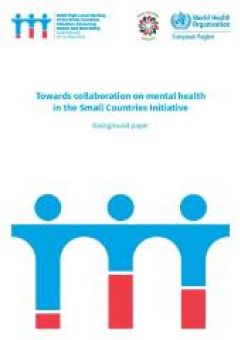
Click to read more
Towards collaboration on mental health in the Small Countries Initiative: background paper
22 January 2024 | Meeting report
This background document was developed specifically for reporting on the status of the eleven countries participating in the Small Countries Initiative (SCI) (Andorra, Cyprus, Estonia, Iceland, Latvia, Luxembourg, Malta, Monaco, Montenegro, San Marino and Slovenia) regarding collaboration on mental health at the Ninth High-level Meeting of the Small Countries Initiative (SCI), Luxembourg, 10–12 May 2023. It summarizes discussions at an online meeting involving mental health experts from the SCI countries, focusing on key priorities such as enhancing mental health support for children and adolescents, strengthening the mental health workforce, and addressing the pervasive issue of stigma and discrimination in mental health care. The meeting underscored the importance of collaborative efforts among small countries to advance mental health care and identified specific actions for the future, emphasizing continuous professional development, empowering individuals with lived experience, and investing in evidence-based campaigns to combat stigma.

Click to read more
The European Psychologist - Vol 28. Issue 4. 2023
Original Articles and Reviews
Can Humans Cooperate to Create a Sustainable Future?
Open Access
Differences Between True and False Autobiographical Memories. A Scoping Review
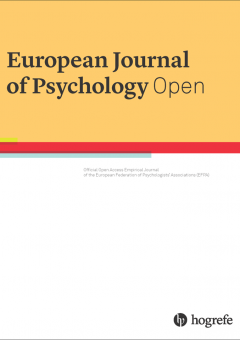
Click to read more
The European Journal of Psychology Open - Vol 82. Issue 4. 2023
Special Issue: The Latest in Psychology from Europe and the World: Insights from the 17th European Congress of Psychology (Part 2)
Open Access
Entangled in the Web of Conflicts. Prolonged Divorce from the Divorcees’ Perspective
The Relationship Between Interpersonal Sensitivity and Emotion Regulation in Youths
Psychological Assessment in Poland. Tracking Changes in Psychologists’ Attitudes Toward Tests and Testing. A Decade’s Perspective








